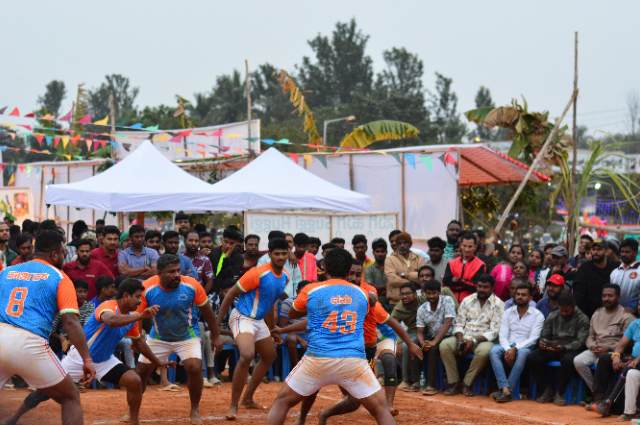
Photo by Rajesh Rajput on Unsplash/Representative Image
In a tragic case that has shaken Tamil Nadu, a Dalit teenager was beaten and had his fingers chopped off — not because he had done anything wrong, but reportedly because he had won a game of Kabaddi.
This horrific act of caste violence took place in the small town of Nanguneri in the Tirunelveli district of Tamil Nadu. The victim, a 17-year-old Scheduled Caste boy, was on his way to school to write his public exams — a highlight in the life of any Indian student. Instead of writing in a classroom, notes in hand with pen, he lay in a hospital bed, fingers amputated, future uncertain.
According to initial reports, the student had only returned from a Kabaddi match—a game that, like cricket, is played with tremendous passion in Indian towns and villages. During the game, he performed marvelously, even better than students who belonged to a higher caste. What might have been a victory moment was a catalyst for ferocious jealousy and long-brewing caste anger.
On 11th March, on route to school to take his Class 11 public exam, a group of upper-caste men allegedly intercepted him. Unprovoked, they took him to a secluded area and beat him up brutally. The worst part? They hacked off his fingers, making him incapable of writing his exams — or even gripping a pen for the next few years. This was not merely a physical attack. It was an attack on ambition, on equality, and plain human dignity. To most Indians across the country, especially in the southern regions, this incident is not an isolated event but part of a much larger, much older trend — one in which Dalits are punished for seeking to move beyond their "assumed" social position. Dalits — once referred to as "untouchables" in India's strict caste system — have been subjected to social discrimination, economic exploitation, and violence for centuries. In rural India, most particularly, caste hierarchies decide who gets to have a chance, who gets to be heard, and yes, who gets to win.
Here, the Kabaddi match turned into a battlefield of physical strength and caste pride. The young boy, by performing better, crossed an unseen but strongly rooted social boundary, and he was made to pay the price.
The parents of the boy, who are traumatized and distraught, have been calling for justice and protection. "He was so enthusiastic about his exams," his father told a local interviewer. "He prepared each day, and Kabaddi was his one respite. He adored it. We never thought this would occur just because he played so well.
Their sorrow is now coupled with fear—with fear that the attackers, having gone unpunished, will attack again. Fear that the boy's life will never revert to the way it was before. And with fear that their other children could fall victim to the same intolerance for hoping too high.
Reactions and Protests The incident has sparked outrage all over Tamil Nadu and beyond. Student unions, human rights activists, and Dalit organizations took to the streets in protest. Social media hashtags demanding justice for the student were trending, and people posted messages of outrage and solidarity. Dr. V. Geetha, a renowned author and Dalit scholar, recently remarked: "This is not Kabaddi. This is the way caste hate reacts to Dalit assertion — even something so ordinary and innocuous as to win a game can be read as a threat."
Opposition parties have also criticized the ruling party for doing nothing and demanded action at once. "This is not the Tamil Nadu we want," a member of one of the stronger parties said. "This is a state that takes pride in social justice — we cannot let it go unpunished.".
Locally, three suspects in the case are reportedly arrested by the police. Charges of attempt to murder and the SC/ST (Prevention of Atrocities) Act have been lodged. But most suspect that, as in so many previous cases, the judicial process will go on forever without actual justice. Dalit rights activists argue that until there is institutional reform and accountability, these incidents will keep happening again and again. "It's not enough to arrest the attackers," argued a lawyer with a Dalit legal aid group. "We need to question why these caste dynamics persist — in our schools, in our villages, in our minds."
And as for the boy himself, the pain is only just the beginning. Doctors have reported that even if he is operated on, complete recovery is by no means certain. He may no longer be able to write with his right hand — a bitter letdown to a young student just beginning his college life. Other than that, the trauma will persist. He has lost not only fingers; he has lost a sense of security, of belongingness. And without long-term rehabilitation, both psychological and academic, he can never return to normal.
This vicious attack is a reflection of Indian society — the ugly truth of caste in 2025. Even after constitutional protections, affirmative action, and years of awareness campaigns, caste continues to determine who comes out on top and gets attacked for coming out on top. But it's also an opportunity — an opportunity to stand together as a nation and to say: this is not correct. To look at the boy getting not only justice, but help: medical, financial, and educational. To hold the powerful to account. And to ensure schools, playgrounds, and exam halls are safe for all children, no matter the caste to which they belong. We prefer to celebrate India's success — our tech sector, our space programs, our recognition in the world. But as long as kids are assaulted for playing a game, for the audacity of dreaming, that success is not yet realized.
